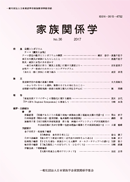Volume 36
Displaying 1-16 of 16 articles from this issue
- |<
- <
- 1
- >
- >|
Special Issue Symposium: Earthquake Disasters and Women
-
2017 Volume 36 Pages 1-3
Published: December 01, 2017
Released on J-STAGE: May 09, 2018
Download PDF (384K) -
2017 Volume 36 Pages 5-10
Published: December 01, 2017
Released on J-STAGE: May 09, 2018
Download PDF (497K) -
2017 Volume 36 Pages 11-20
Published: December 01, 2017
Released on J-STAGE: May 09, 2018
Download PDF (753K) -
2017 Volume 36 Pages 21-27
Published: December 01, 2017
Released on J-STAGE: May 09, 2018
Download PDF (3402K)
Articles
-
2017 Volume 36 Pages 29-41
Published: December 01, 2017
Released on J-STAGE: May 09, 2018
Download PDF (357K) -
Contraceptive Practices of North Korean Women: With a Focus on State Policy and Individual Responses2017 Volume 36 Pages 43-54
Published: December 01, 2017
Released on J-STAGE: May 09, 2018
Download PDF (448K)
Reports
-
2017 Volume 36 Pages 55-63
Published: December 01, 2017
Released on J-STAGE: May 09, 2018
Download PDF (1094K) -
2017 Volume 36 Pages 65-74
Published: December 01, 2017
Released on J-STAGE: May 09, 2018
Download PDF (7235K)
Book Reviews
-
2017 Volume 36 Pages 75-76
Published: December 01, 2017
Released on J-STAGE: May 09, 2018
Download PDF (317K) -
2017 Volume 36 Pages 77-79
Published: December 01, 2017
Released on J-STAGE: May 09, 2018
Download PDF (320K) -
2017 Volume 36 Pages 80-81
Published: December 01, 2017
Released on J-STAGE: May 09, 2018
Download PDF (317K)
-
2017 Volume 36 Pages 82
Published: December 01, 2017
Released on J-STAGE: May 09, 2018
Download PDF (314K) -
2017 Volume 36 Pages 83
Published: December 01, 2017
Released on J-STAGE: May 09, 2018
Download PDF (313K) -
2017 Volume 36 Pages 84
Published: December 01, 2017
Released on J-STAGE: May 09, 2018
Download PDF (314K) -
2017 Volume 36 Pages 85
Published: December 01, 2017
Released on J-STAGE: May 09, 2018
Download PDF (314K) -
2017 Volume 36 Pages 86
Published: December 01, 2017
Released on J-STAGE: May 09, 2018
Download PDF (316K)
- |<
- <
- 1
- >
- >|
